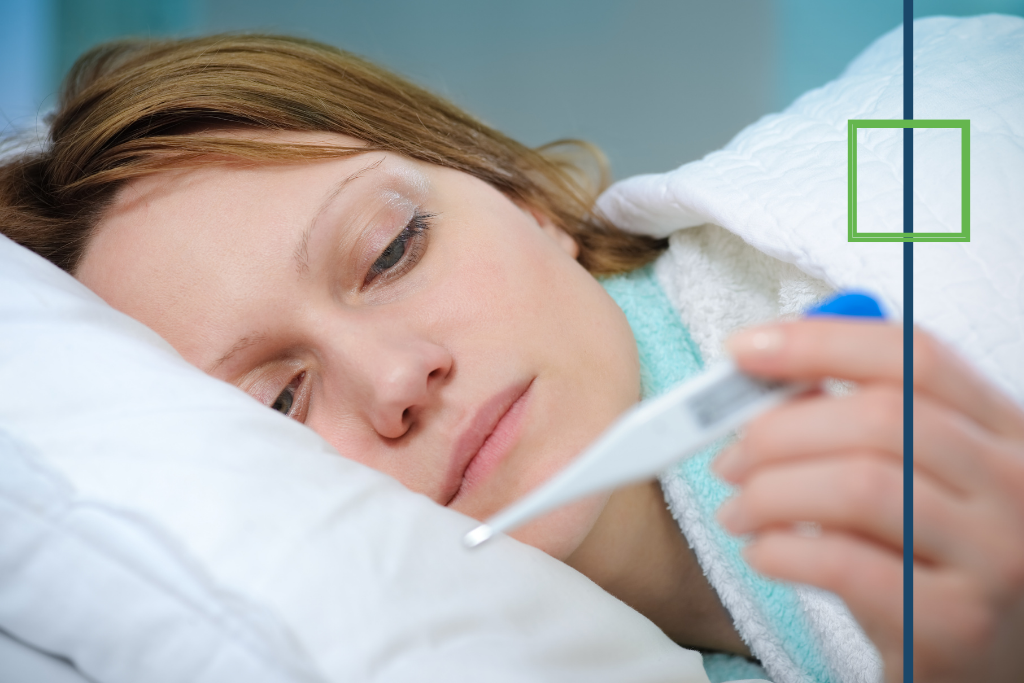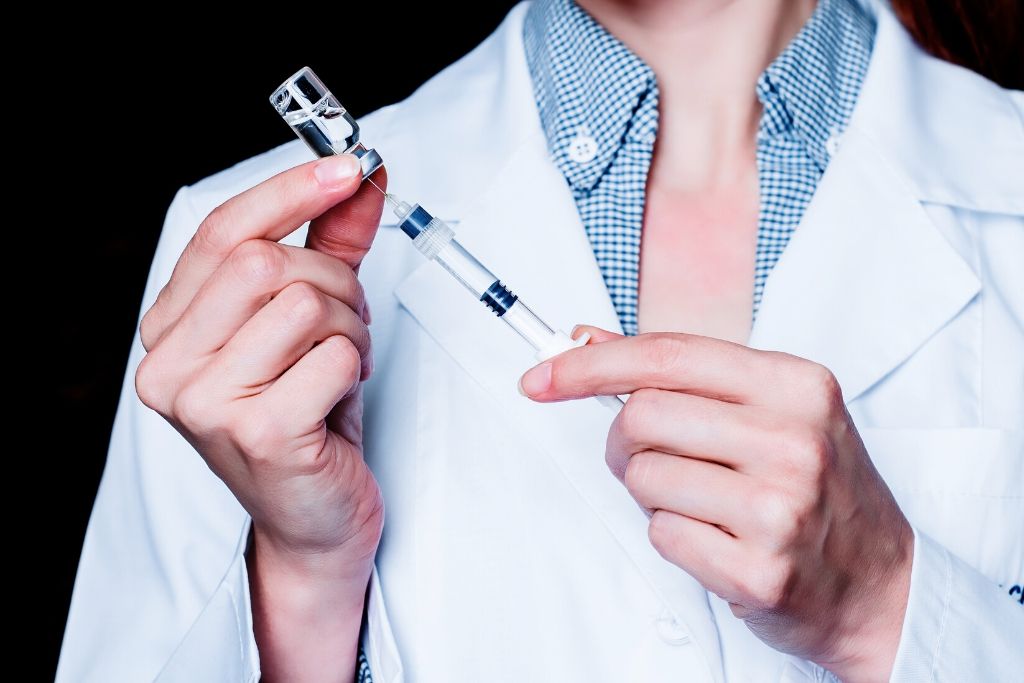What is Alcohol Withdrawal Fever?
A fever can be a withdrawal symptom among individuals who have been addicted to various substances or even after a period of intense substance use. Fever symptoms may range from mild to severe. Although mild fevers can accompany a variety of substance withdrawal syndromes and are usually self-limiting, fever can also be a component of a particularly dangerous type of alcohol withdrawal.
Instances, where fever has no determinable cause and persists for an extended period of time can indicate that the alcohol detox process has taken a nasty turn. This symptom is associated with the most severe type of withdrawal, commonly known as delirium tremens (DTs).
What is a fever?
Fever is one of the body’s most original defenses against infection or assault. The technical definition for medical practitioners defines this as a core body temperature of 100.4-100.9 F, which is about 3 degrees higher than what is considered an average temperature.


Get Your Life Back
Find Hope & Recovery. Get Safe Comfortable Detox, Addiction Rehab & Mental Health Dual Diagnosis High-Quality Care at the We Level Up Treatment Centers Network.
Hotline (877) 378-4154Along with a fever, you may have these symptoms:
- Weakness
- Appetite loss
- Shivering
- Sweating
- Headache
- Achy muscles
- Dehydration
How is alcohol withdrawal syndrome diagnosed?
A doctor can often diagnose alcohol withdrawal syndrome by taking a person’s medical history and doing a physical exam. The doctor may ask for evidence that there has been a decrease in alcohol use after regular heavy use. They may also do a blood test called a toxicology screen to measure the amount of alcohol in a person’s system. Blood tests and imaging tests can show if organs, such as the liver, have been affected by a person’s intake of alcohol.
Doctors take alcohol withdrawal fever very seriously, and in medical detox, all fevers are thoroughly investigated to make sure that they are not the result of an underlying infection, which should be treated immediately. Alcohol and drug users may be more vulnerable to infections for a variety of reasons, and both drug effects and withdrawal symptoms may mask the need for urgent treatment for another condition.
Can alcohol withdrawal cause fever?
Unfortunately, the question “can alcohol withdrawal cause fever?” is a little more complex than a yes or no. Mild fever itself is considered an inconsistent but possible early sign of alcohol detoxification. It is listed as a 1st-degree symptom (degrees of alcohol withdrawal are numbered 1-4 according to their severity), much like those of tremors, increased heart rate, and sweating, but is not needed for a diagnosis of alcohol withdrawal.
This is likely not a typical process that the body employs a fever for, which is to fight infection but is more so the result of all of the body’s metabolic functions being up-regulated. Up-regulation of the body’s metabolism is a known source of increased body temperature but acts somewhat differently than a true fever in that it is the energetic components of the body that cause the overall raised temperature, not a deliberate attempt to eliminate a foreign presence.
Get Help. Get Better. Get Your Life Back.
Searching for Accredited Drug & Alcohol Rehab Centers Near You? Or Mental Health Support?
Even if you have failed previously, relapsed, or are in a difficult crisis, we stand ready to support you. Our trusted behavioral health specialists will not give up on you. Call us when you feel ready or want someone to speak to about therapy alternatives to change your life. Even if we cannot assist you, we will lead you wherever you can get support. There is no obligation. Call our hotline today.
FREE Addiction Hotline – Call 24/7Is Fever During Alcohol Withdrawal Dangerous?
Fever can benefit a detoxing alcoholic by indicating a related illness such as a kidney infection caused by dehydration. However, if an alcohol withdrawal-related fever persists for more than 72 hours, it is often considered a medical emergency. The danger does not lie with the fever itself, which is more of an accessory symptom, but because of the other symptoms that accompany delirium tremens, such as:
- Cardiovascular collapse
- Hallucinations (audial and visual)
- High blood pressure
- Extreme confusion and agitation
- Restlessness
- Insomnia
- Seizure
- Coma
Treatment for delirium tremens can take close to two weeks of hospitalization. It typically involves IV fluids to prevent dehydration and medication from treating seizures or other DT symptoms.
The Cause of Alcohol Withdrawal Fever
As is the case with most nasty withdrawal effects, they are usually brought on by quitting a substance cold turkey. Withdrawal symptoms only occur when the body has developed physical dependence, however. When this happens, the brain’s neurochemistry has been permanently disrupted due to the brain not having functioned normally for quite some time.
It is estimated that about 50% of alcoholics experience withdrawal symptoms when they eventually stop drinking. The effects, albeit unpleasant, are often relatively mild. These symptoms include headache, high blood pressure, nausea, and vomiting. However, long-term heavy drinkers have the highest risk of developing delirium tremens, which could land them in the emergency room. Although the likelihood of this occurring is low, only 5% of alcohol withdrawal ends up being this severe.
In the case of alcohol withdrawal fever, it is not serving fever’s usual purpose of heating the body to kill bacteria. Instead, it results from a dramatic shift in the brain and nervous system activity. Excessive drinking suppresses neurotransmitters and forces them to work in overdrive to continue functioning. When you suddenly cause stop drinking, your neurotransmitters can take a while to catch up, slow down, and return to normal. This in-between period where your body is working extra hard to overcome a substance that isn’t there is what causes withdrawal and, in particularly bad cases, alcohol withdrawal fever.
Comfortable Facilities & Amenities
High-Quality Addiction & Mental Health Rehabilitation Treatment
Rehab Centers TourRenowned Addiction Centers. Serene Private Facilities. Inpatient rehab programs vary.
Addiction Helpline (877) 378-4154Proven recovery success experience, backed by a Team w/ History of:
15+
Years of Unified Experience
100s
5-Star Reviews Across Our Centers
10K
Recovery Success Stories Across Our Network
- Low Patient to Therapist Ratio
- Onsite Medical Detox Center
- Comprehensive Dual-Diagnosis Treatment
- Complimentary Family & Alumni Programs
- Coaching, Recovery & Personal Development Events
How is alcohol withdrawal syndrome treated?
Appropriate treatment of alcohol withdrawal can relieve the patient’s discomfort, prevent the development of more severe symptoms, and forestall cumulative effects that might worsen future withdrawals. Inpatient alcohol rehab admission provides the safest setting for the treatment of alcohol withdrawal.
The symptoms of alcohol withdrawal reflect overactivity of the autonomic nervous system, a division of the nervous system that helps manage the body’s response to stress. The signs and symptoms of alcohol withdrawal typically appear between 6 and 48 hours after heavy alcohol consumption decreases. Initial symptoms may include headache, tremor, sweating, agitation, anxiety and irritability, nausea and vomiting, heightened sensitivity to light and sound, disorientation, difficulty concentrating, and, in more serious cases, transient hallucinations. These initial symptoms of alcohol withdrawal intensify and then diminish over 24 to 48 hours.

Delirium tremens (DT’s), the most severe and intense syndrome associated with alcohol withdrawal, is characterized by extreme agitation; tremors; disorientation; persistent hallucinations; and significant increases in heart rate, breathing rate, pulse, and blood pressure. DTs occur in approximately 5 percent of patients undergoing withdrawal and usually appear 2 to 4 days after the patient’s last use of alcohol. Seizures occur in up to 25 percent of withdrawal episodes, usually beginning within the first 24 hours after cessation of alcohol use.
Inpatient detoxification provides the safest setting for the treatment of alcohol withdrawal because it ensures that patients will be carefully monitored and appropriately supported. Compared with outpatient facilities, inpatient clinics may provide better continuity of care for patients who begin alcoholism treatment while in the hospital. In addition, inpatient detoxification separates the patient from alcohol-related social and environmental stimuli that might increase the risk of relapse.
Drug and alcohol withdrawal can pose risks for relapse, overdose, medical and psychological complications, and even death. Attempting to withdraw on your own can increase the risk for dangerous outcomes, especially when withdrawing from alcohol and other central nervous system depressants.
Medical detox programs offer the opportunity to go through withdrawal in a safe environment with careful monitoring by professionals. Medical staff will carefully monitor withdrawal symptoms and provide medical treatment to reduce discomfort and prevent complications like delirium and seizures. This type of detox from drugs and alcohol can be accomplished in an inpatient setting. Inpatient medical detox programs offer the opportunity to detox in a highly structured environment with 24-hour monitoring.
Treatment after withdrawal involves learning how to cope with triggers and urges to use alcohol and other drugs and investigating what contributed to the addiction. Continuing treatment options can include inpatient rehab, where a person stays at a facility for an extended period of time. During an inpatient stay, you will have the opportunity to focus exclusively on your recovery without the stressors of everyday life.
Withdrawal Medications
The medications your doctor may prescribe to help alleviate symptoms of withdrawal will vary depending on the type of substance you were taking. Some medications that are used to treat various types of withdrawal include:
- Catapres (clonidine)
- Librium (chlordiazepoxide)
- Buprenex (buprenorphine)
- Valium (diazepam)
- Ativan (lorazepam)
- Methadone
Other medications may also be used to manage specific withdrawal symptoms. These may include anti-anxiety medications, anticonvulsants, antipsychotics, or other drugs designed to treat nausea or sleep problems.
World-class, Accredited, 5-Star Reviewed, Effective Addiction & Mental Health Programs. Complete Behavioral Health Inpatient Rehab, Detox plus Co-occuring Disorders Therapy.
CALL (877) 378-4154End the Addiction Pain. End the Emotional Rollercoaster. Get Your Life Back. Start Drug, Alcohol & Dual Diagnosis Mental Health Treatment Now. Get Free No-obligation Guidance by Substance Abuse Specialists Who Understand Addiction & Mental Health Recovery & Know How to Help.
Alcohol Treatments in New Jersey Rehab Center
Medically-assisted Detox
Detox from alcohol is often considered the first stage of treatment. It will help you navigate the complicated process of alcohol withdrawal, but it doesn’t address patterns of thought and behavior that contribute to alcohol use. Various treatment approaches and settings can help provide the ongoing support necessary to maintain long-term sobriety after you complete detox.
Cravings are very common during detox from alcohol and can be challenging to overcome. This often leads to relapse. Constant medical care provided during inpatient treatment helps prevent relapse. Clinicians can provide necessary medication and medical expertise to lessen cravings and the effects of alcohol withdrawals, including fever from alcohol withdrawal.
Medication-Assisted Treatments
Medication-Assisted Treatments (MAT) for alcohol use disorder and mental health disorders are commonly used in conjunction with one another. This includes the use of medications and other medical procedures. During your rehab, the staff from your treatment facility will help you identify what caused your addiction and teach you skills that will help you change your behavior patterns and challenge the negative thoughts that led to your addiction. Sometimes, the pressures and problems in your life lead you to rely on substances to help you forget about them momentarily.
Dual Diagnosis Programs in New Jersey
Mental health disorders such as depression and anxiety, and alcoholism often co-occur. In many cases, traumatic experiences can result in a mental health disorder and substance abuse. Dual diagnosis rehabilitation treats both of these issues together. The best approach for the treatment of dual diagnosis is an integrated system. In this strategy, both the mental disorder and the substance abuse problem are treated simultaneously. Regardless of which diagnosis (mental health or substance abuse problem) came first, long-term recovery will depend largely on the treatment for both disorders done by the same team or provider.
Behavioral Therapies
Cognitive Behavioral Therapy (CBT) and Dialectical Behavioral Therapy (DBT) can improve addicts’ behavior. CBT targets negative and maladaptive thought patterns as it promotes positive emotions and beliefs, while DBT helps clients address conflicting impulses so they can make healthy choices. Both therapies treat substance abuse and mental health disorders. Therapy also empowers clients to identify, avoid and mitigate cues that trigger drug cravings.
Individual and Group Counseling
Addiction and mental health counseling occur in both individual and group settings. One-on-one treatment sessions may address unresolved trauma, unconscious conflicts, and specific struggles, while group sessions often involve training in life skills, stress management, conflict resolution, and social connections. Group counseling also gives clients the chance to share their thoughts and experiences to develop social support, which is essential for lasting recovery.

Alcohol Withdrawal Fever: What To Do Next
If you are undergoing alcohol detox at home and experience alcohol withdrawal fever for more than 72 hours, seek medical help right away. High-grade or long-lasting fevers could be alcohol withdrawal fever caused by dangerous delirium tremens. This condition isn’t something you should try to wait out by yourself. If you or a loved one are struggling with long-term substance abuse, showing alcohol withdrawal symptoms, and a co-occurring mental health condition such as depression, contact one of our helpful treatment specialists today. We Level Up NJ can provide information on dual diagnosis and detox programs that may fit your specific needs.
Experience Transformative Recovery at the We Level Up Treatment Center.
See our authentic success stories. Get inspired. Get the help you deserve.



Start a New Life
Begin with a free call to an addiction & behavioral health treatment advisor. Learn more about our dual-diagnosis programs. The We Level Up treatment center network delivers various recovery programs at each treatment facility. Call to learn more.
- Personalized Care
- Caring Accountable Staff
- Comfortable Amenities
- Licensed & Accredited
- Renowned w/ 5-Star Reviews